A long time ago, in a card game store far far away. Okay, it’s really not that long ago, and the card games stores aren’t really that far away. Star Wars Day is right around the corner and you can get in the Star Wars mood with a brand new Star Wars game: Star Wars Unlimited – and you don’t even need a fancy computer or TV setup for this one.
Star Wars Unlimited
Join the Rebel Alliance or turn to the dark side in the new Star Wars Unlimited card game. It’s a two player game where each player chooses a battle side. The starter kit comes complete with each leaders’ deck – Luke Skywalker or Darth Vader.
These are pre-built decks designed to get players quickly and seamlessly into the game. The kit has plenty of cards for both players to have a deck. This set focuses on the Star Wars Galactic Civil War era, mainly centering on the original trilogy (episodes four to six), Star Wars Rebels, and Rogue One.
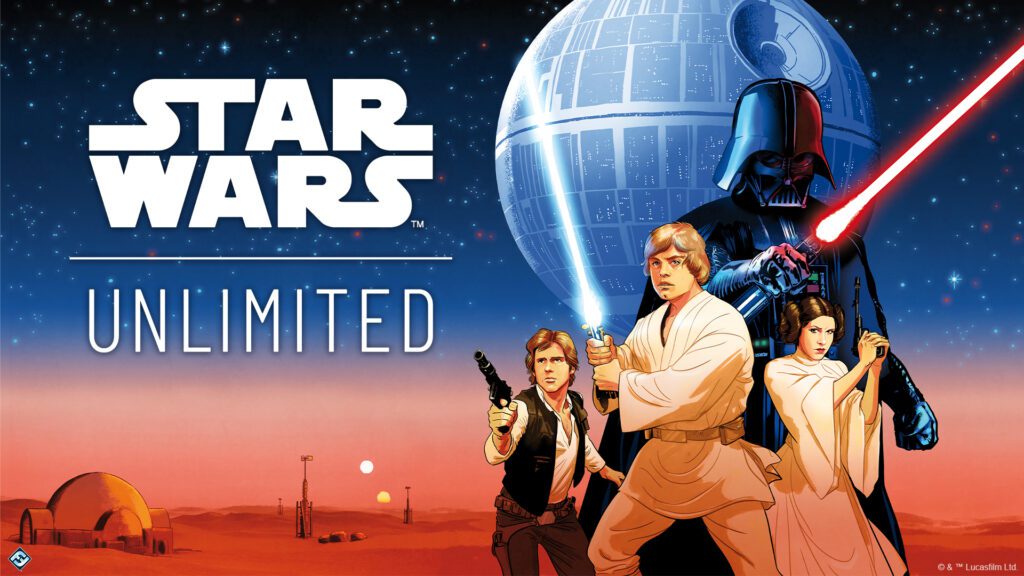
Star Wars Unlimited is fast-paced, easy to learn, yet still involves a lot of strategy. There are three types of formats that are very typical of trading card games (TCG). These are:
- Constructed: players build their down decks consisting of 50 cards. The deck must include one leader card and one base card. Decks can’t have more than three copies of the same card.
- Draft: players take three packs of cards, open them and smash them together to form a deck.
- Sealed: players take six packs of cards and assemble them into a deck.
- Multiplayer: this is a format to accommodate more than two players. Details on this format will be available soon.
The game and the cards
Unlike typical TCGs, Star Wars Unlimited features cards that have a vertical and horizontal format. On the front side is the horizontal format, which explains card’s actions, and on the back is a vertical face which shows what happens when the card attacks – it transforms into a unit card. The horizontal card format is shown for abilities only, and isn’t a unit card. Only leader cards have two faces. All other cards only have a single face.
You’ll find all your favourite characters, ships, and settings from across the galaxies. Lore from the films, TV series, video games, and even comics is included in this game. Some of my favourite characters, ships, and places are included in the starting series including Bo-Katan Kryze, Grogu, Hera Syndulla, the Razor Crest, and Capital City among others.
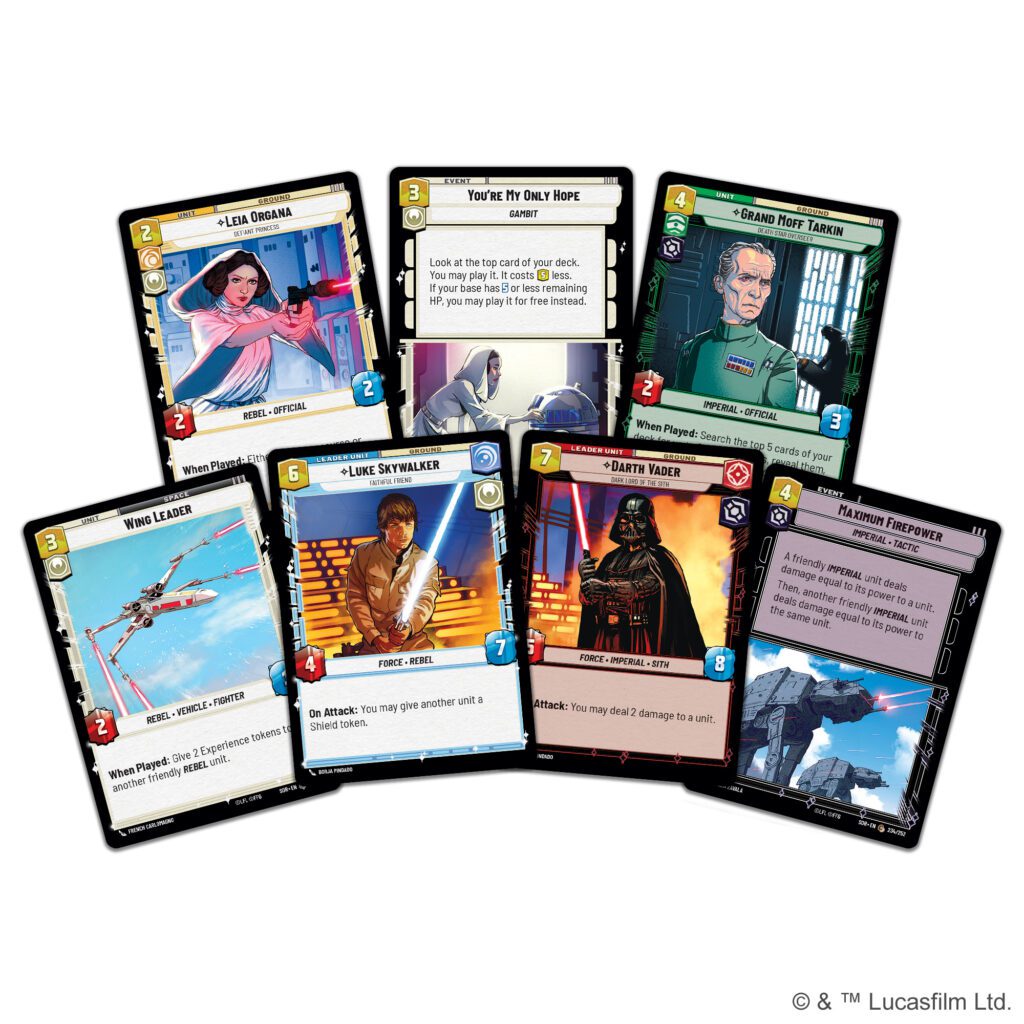

Setting up Star Wars Unlimited
The aim of Star Wars Unlimited is to destroy the enemy base. Each player has a base with 30 hit points (HP). This would be the equivalent to life points or leader points in other card games. By decreasing your opponent’s HP to zero, you win the game.
Start the game by facing each base card towards each other. The leader card goes in play below the base card, facing the horizontal side up (non-unit side). Set all the tokens and counters to the side of your play area. Determine which player starts the game; either by dice roll, or scissors/paper/rock, you decide how you choose the starting player.
Once you’ve chosen your starting person, they receive the initiative counter, which is placed in the bottom left-hand corner (or wherever you like really, it doesn’t matter).
Both players shuffle their decks and draw six cards. Players can choose to mulligan their hand if they want. This means they shuffle all six cards into their deck and draw six new cards.
It is recommended to mulligan if you don’t have any units that cost one or two points to the player. Otherwise, you’ll get stuck not being able to play anything in the first couple of rounds, and that’s not a very fun game!
Playing Star Wars Unlimited
The gameplay works where each player takes turns to play. Similar to many other TCGs, Star Wars Unlimited features phases within each players’ turn. Star Wars Unlimited consists of two main phases, where each player can perform certain tasks:
- Action Phase: in this phase, players can play a card, attack with a unit, use an action ability, take the initiative, or pass.
- Regroup Phase: after the attack phase, both players complete the regroup phase together. The regroup phase must be completed in three steps, in the correct order:
- both players draw two cards each.
- the player with the initiative counter goes first and decides whether to choose one card from their hand and put it face down in play as a resource. The other player then chooses.
- Each player readies all their cards in play, and the turn passes to the next person.
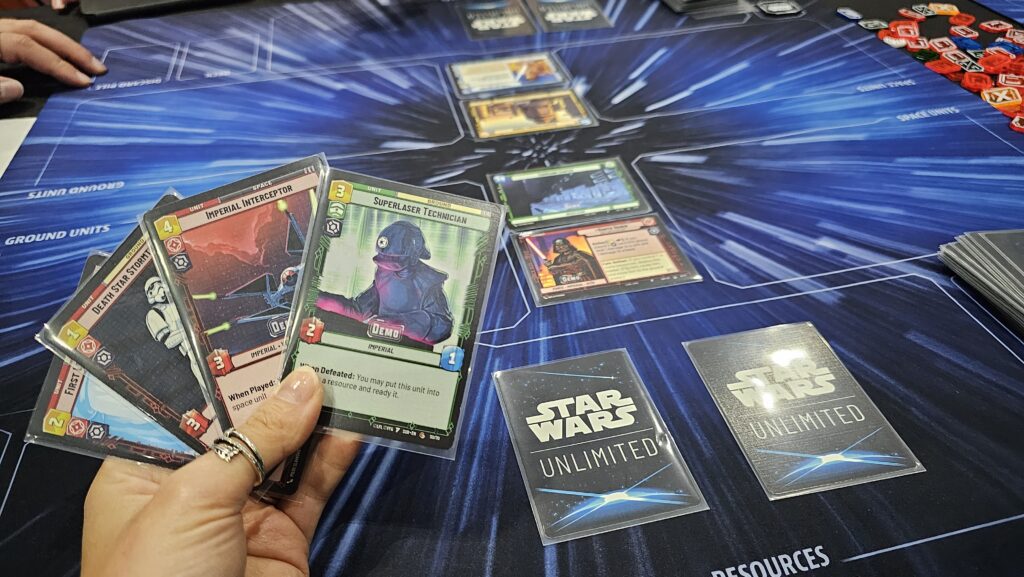

What do all the cards do?
Playing a card costs resources. In other card games, this might be called mana, or play points. The cost is in the top left-hand corner (the yellow number you can see in the image above). There are three main types of cards:
- Units
- Events
- Upgrades
And a fourth if we count resource cards.
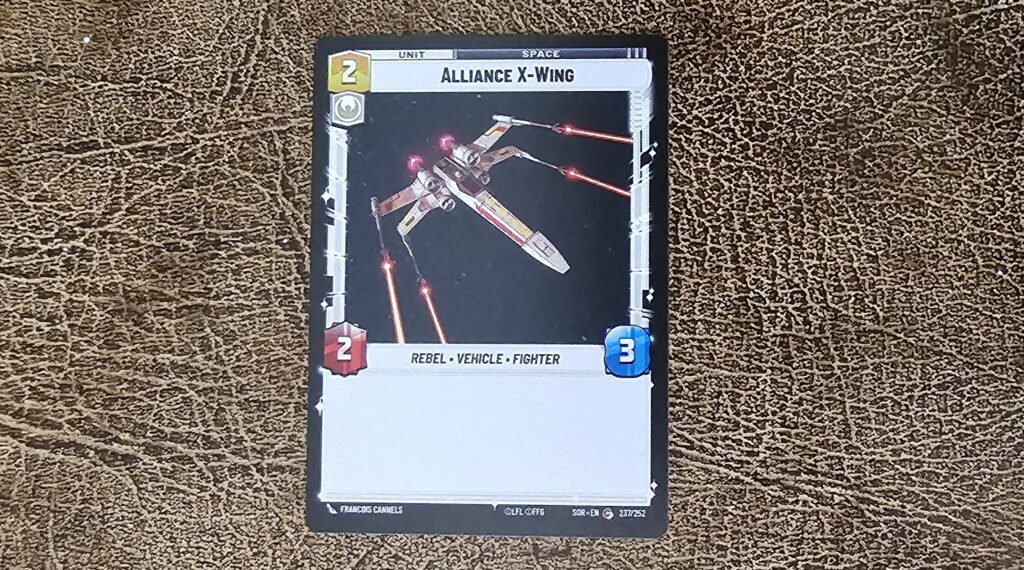

Unit cards
Unit cards enter play exhausted and are turned on their side to indicate so. Unit cards are then readied by switching them to the upright position. These cards stay in play until defeated. Players can defeat a unit card by dealing damage to the card (depleting the cards’ HP).
There are two main types of units: ground units and space units (or air units). All unit types are eligible to attack the base. The top of the card will indicate if it’s a ground unit or a space unit.
There are areas of the play board where you should playground units and space units. During combat, players can only attack ground units with ground units, and space units with space units.
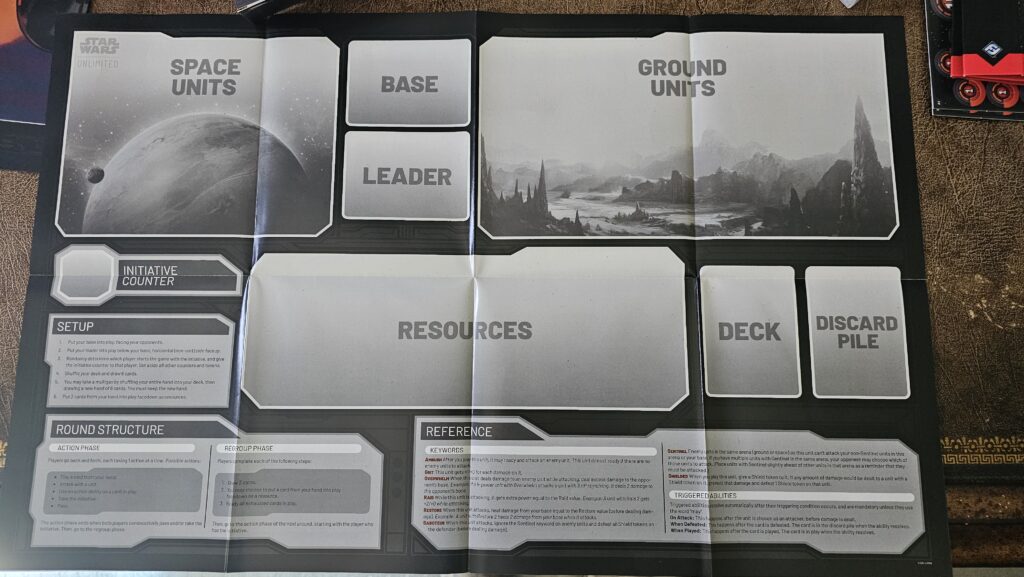

Event and upgrade cards
These are the cards that have abilities in their text space on the card. When an event card is play, the ability is activated and then the card is sent to the discard pile.
Upgrade cards are attached to a unit card and remain in play until the unit is defeated. You can think of these cards are items that the unit can use. For example, you can attach a lightsaber card to a unit card to increase the unit’s attack, and you might even be able to activate an additional ability.
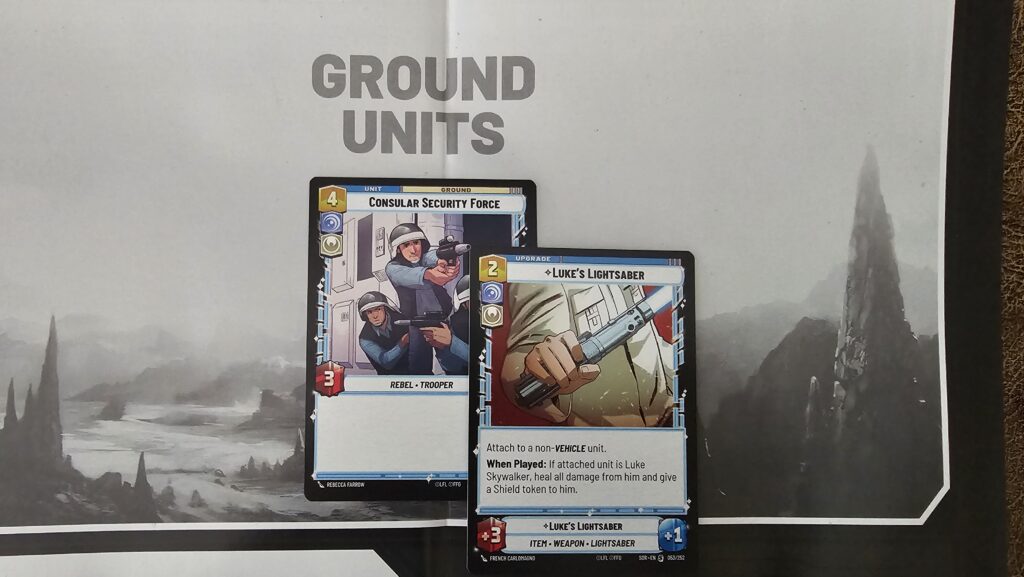

Leader cards
These cards are important to any battle and come with unique abilities. Each leader has an Epic Action that can be performed when certain criteria are met during the game. Once you meet the required resources, you can deploy your leader card as a unit and use their power to overthrow your opponent.
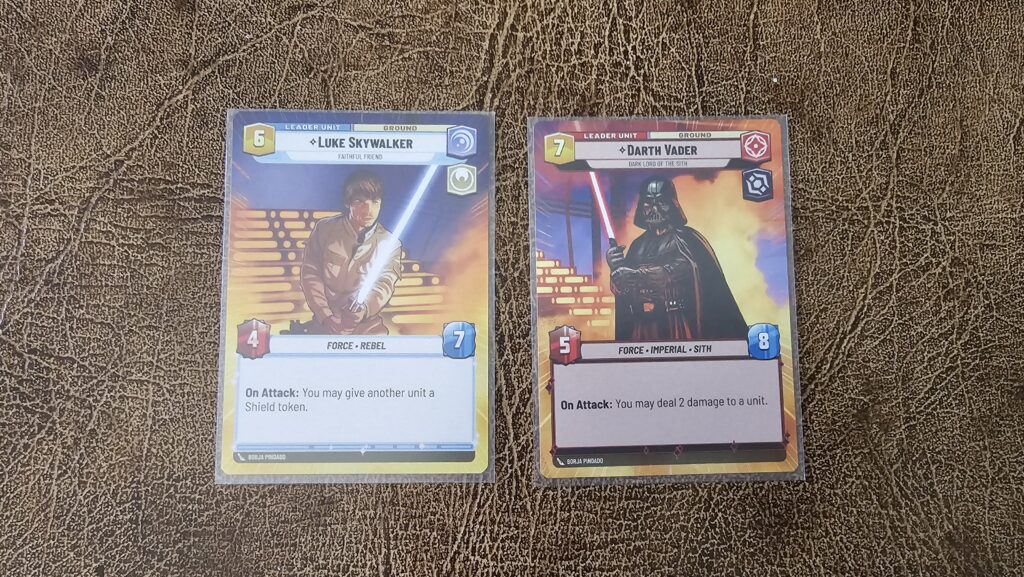

Other card features
Cards also have traits, for example, Rebel or Imperial. Whilst these traits don’t have rules themselves, other card abilities can be affected by certain traits. Tokens or counters are added to your units based on other card effects. For example, a card might instruct you to a +1/+1 counter to your card to increase its attack and defence by one.
I found very quickly that the counters started adding up, leading to a very cluttered game board. It’s fair to say you’d need a fair bit of space to play this game, or maybe a more innovative way to add counters – something that stacks perhaps. It is good however, the team decided to reduce the sheer number of counters needed, by providing counters for 1, 5, and 10 damage rather than having to stack a hefty number of 1’s together.
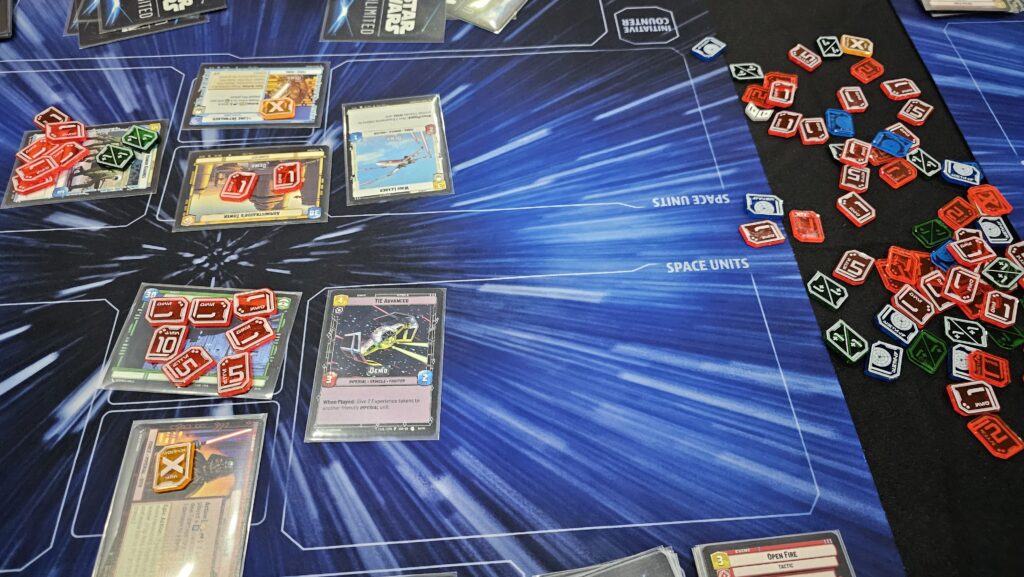

3D print your own counter pieces
You might be thinking how do you actually get enough counters for everything? Yes, the decks come with some counters to get you started (these are cardboard and get quickly tattered), but you often need more than what’s in the box. Magic: The Gathering players will probably turn to counter dice or counter pieces.
Players often use other random trinkets lying around the house, such as old pennies, dice, or beads. The starter pack comes with some counters and tokens, but you’ll likely use these up quickly. If you’re looking for a way to really spice up your kit, jump over to Thingiverse and 3D print some counters. If you don’t have a 3D printer yet, check out our guides on 3D printing.
Get the game and celebrate Star Wars day
The game is now available worldwide, and it’s the perfect start to Star Wars day coming next week. You can purchase the Starter Kit as well as booster packs. Head over to the Star Wars Unlimited website to find your local retailer.
Prices start at $8.99 AUD for booster packs (includes 16 cards), and $59.95 AUD for the Starter Kit. There’s also a pre-release kit available for $49.95 AUD and includes two special promo cards. The Starter Kit is for the real fans in the room, as you’ll receive ten cards that can’t be found in booster packs


Booster packs are for the hunters and collectors. Yes they are required for draft and sealed formats, but they are also for collecting. Each booster pack will have at least one rare or legendary card, one foil card, one leader, one base or token, two to three uncommon cards, and nine common cards.
These packs also have the chance for players to acquire borderless cards, called “Hyperspace” alternatives. This is available for every type of card. Whilst Spark of Rebellion is the first set in the series, more sets are coming, with Shadows of the Galaxy launching in July, and Twilight of the Republic coming in November this year.
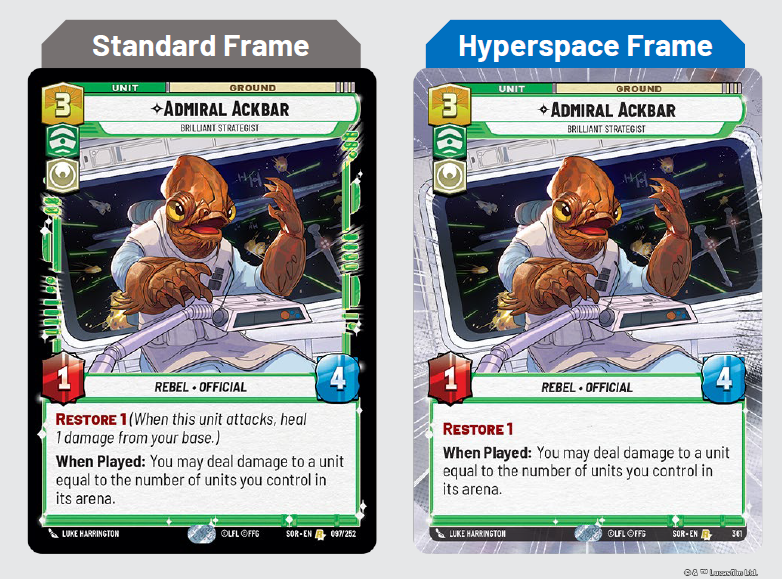

Star Wars Unlimited is such a fun way to celebrate Star Wars day. It’s a relatively easy game to get into and fans will love the lore and nostalgia. If you’re thinking of other ways to celebrate Star Wars day (May 4th) you can check out how Seagate celebrated with some new merch, build some Star Wars LEGO, watch Bad Batch on Disney+, or joining Village Cinemas to celebrate the 25th anniversary Star Wars Episode 1: Phantom Menace.
